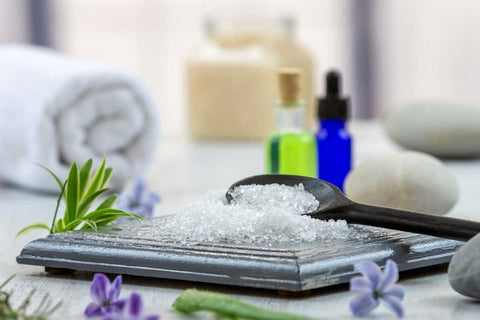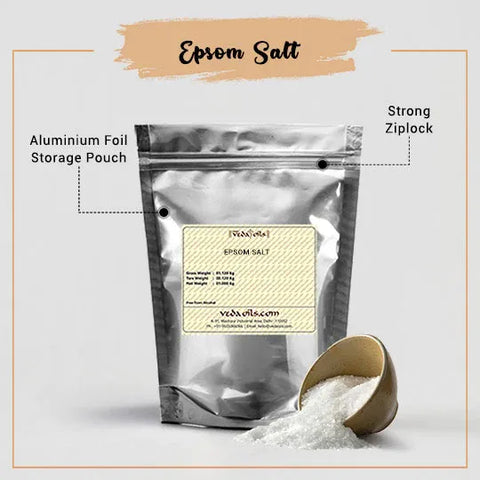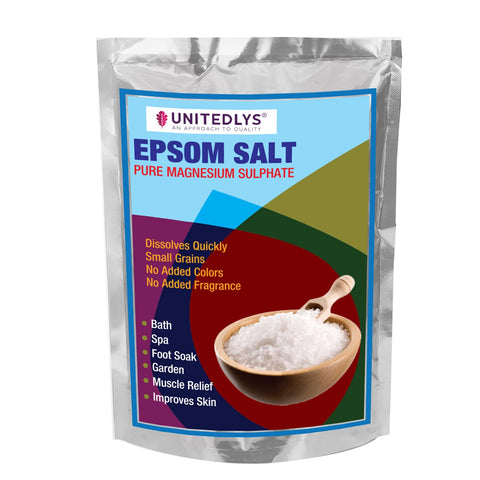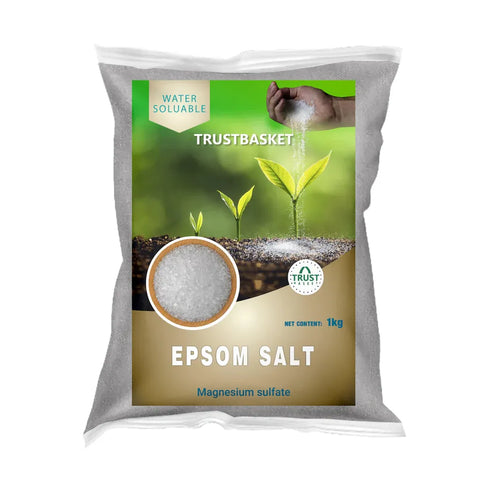Epsom Salt For Lawn - How It Helps Your Lawn Stay Green
Many homeowners find it difficult to keep their lawn as lush as possible. Epsom salt, a salt based on magnesium, is good for your garden and lawn. It never looks nice in a community when your grass is looking less green and sickly. This issue will be resolved with epsom salt, which also serves as a fertiliser and pesticide, extending the life of your grass and garden.

Epsom salt should generally be used in the spring to promote strong, lush growth. During this period, lawns develop leaves that are greener and more photosynthetic as the growing season progresses. This article will talk more about using epsom salt for lawns. Read on!
Is Epsom Salt A Good Lawn Fertilizer?
Applying Epsom salt to your lawn is a secure, all-natural way to promote seed germination, nutrient uptake, growth, and general plant and lawn health. Magnesium, which is present, aids in the aforementioned.
Epsom salt may be used as a natural pesticide substitute in addition to being a fertiliser. Simply scatter some Epsom salt in the area to deter slugs, for example, if your flowerbeds are overrun with them.
Epsom salts can be a successful deterrent if you have a raccoon problem as well (they don't like the smell). Just scatter a little bit of it all along your lawn's edge.
Benefits Of Epsom Salt For Lawn
Epsom salt is a risk-free, all-natural substance that may be used to boost seed germination, nutrient absorption, growth, and overall plant and grass health. Here's how it can benefit your epsom salt for lawn:

1. Epsom Salt For Foliage
Tree leaves, shrubbery, hedging, vegetable leaves, flowers, and grasses occasionally may seem yellow, dried out, or curled. This is an indication of a magnesium deficit, providing you rule out any seasonal or environmental factors that might have contributed to the problem.
Spray the golden foliage with a solution of epsom salt for lawn once a month to keep it vibrant green.
2. Epsom Salt For More Blooms
Epsom salt, which is high in magnesium, will greatly aid your garden's flowering process. Epsom salt can strengthen and colourize flower growth. Don't forget to add Epsom Salt to the soil if you plan to grow flowers shortly.
Additionally, every two to three weeks, you should sprinkle an Epsom salt solution on newly planted (or older) flowers. For gardenias, azaleas, rhododendrons, bougainvillaea, and roses in particular, this treatment is advised.
3. Epsom Salt For Stronger Lawns
Epsom salt is useful for growing more than simply flowers and veggies. Spray the grass with an Epsom salt solution once a month to keep it green and healthy all year. This will make your front yard turf seem rich and inviting. This process aids in the germination and growth of grass seeds into robust blades.
The procedure makes sure that the turf maintains its roots no matter what the weather, how much it is cut, or even physical harm.
4. Epsom Salt For Sweeter Vegetables
Epsom salt's ability to increase chlorophyll also implies that plants will have more energy to devote to growing fruits and vegetables. Therefore, using Epsom salts in moderation might result in fruits and vegetables that are sweeter, tastier, and possibly more numerous.
5. Epsom Salt To Prevent Transplant Shock
When shifting plants from a smaller container to a bigger one or from a greenhouse to an outside garden bed, "transplant shock" is sometimes experienced.
Epsom salt promotes photosynthesis, the process by which plants transform light energy into chemical energy that may subsequently be utilised as fuel, by raising chlorophyll levels in plant cells.
Epsom salts may be added to your plant's new environment as a fantastic technique to combat transplant shock.
6. Epsom Salt For Nutrient Absorption
Because it aids in the absorption of essential nutrients like nitrogen, phosphorus, and sulphur by plant roots, magnesium is a crucial component of fertiliser. You may avoid using processed chemical fertilisers by utilising the magnesium rich epsom salt, which is among the greatest ways to organically increase nutrient absorption.
When To Use Epsom Salt on Your Lawn?
Magnesium sulfate-containing Epsom salt is a naturally occurring mineral compound that may be used to your grass for specific advantages or a general strategy.
Epsom salt contributes to a greener, healthier, and softer lawn by strengthening the grass and supplying nutrients. If you see the health of your lawn starting to deteriorate, you should consider using epsom salt.
How Much Epsom Salt Should I Apply?
Epsom salt may be used as a spring lawn fertiliser to promote lush green growth. To each 3.7 L of water used on the grass, add 29.5 ml of epsom salt for lawn. If you have a sprinkler system, softly sprinkle immediately on the grass and then let the system water into the sod.
How To Apply Epsom Salt In Your Lawn?
Using epsom salt for lawns will enable the lush green growth and healthy appearance that you want to see in your yard. Nobody likes to be in a yard with bad-looking grass! Here's how you can use epsom salt and get your lawn looking healthy:

1. Mix With Lawn Fertilizer
Add 2 tablespoons of epsom salt to 4 litres of water. To prevent harming your grass, carefully read the labels on any products you use and adhere to the instructions. The proper amount of Epsom salt will give you the results you want, but you must realise that Epsom salt doesn't serve a very specific function, so you shouldn't use it excessively.
2. Apply With A Sprinkler System
Utilizing soil drench, Epsom salt may be diluted with water to act as a soil drench. Instead, you might as well use a spray system and think about mixing salt directly into the soil.
3. Add To Your Garden Hose
Epsom salt may be added to the water that is being used to water your grass as it passes through your garden hose.
4. Spread By Hand
If none of the aforementioned choices appeal to you, you may always take the traditional route and sprinkle Epsom salt on your grass. If none of the aforementioned choices appeal to you, you may always take the traditional route and sprinkle Epsom salt on your grass using your bare hands!
Precaution Of Using Epsom Salt In Your Lawn?
Despite the fact that Epsom salts for plants have several advantages, it's important to always exercise caution while using them. The phrase "the poison is in the dose" applies to many things, including this one.
Epsom salts used in excess generally won't hurt your plants, but it's essential to exercise caution and abide by the aforementioned instructions.
Best Epsom Salt For Lawn Care
You now know all about the use of epsom salt for lawns. But with so many options available in the market, how do you choose one? We’ve made it easier for you! Here’s the top 3 epsom salt for lawn that you can get:
1. VedaOils Epsom Salt
To raise the soil's magnesium or sulphur content and facilitate the growth of crops that require magnesium, such as potatoes, tomatoes, carrots, etc., VEda Oil's natural Epsom salt can do wonders.

Additionally, it aids in bringing the soil's pH level to a neutral state. Plants become more lush and green when this salt and water solution is sprayed on them.
2. Unitedlys Epsom Salt
Unitedlys Magnesium sulphate, or Epsom salt, is a fine, crystalline salt that is beneficial to plants. This gardening trick will wow your neighbours.

Magnesium and sulphur, which are included in epsom salt fertilisers for plants in the home garden, help plants grow healthier in a number of ways. Use it on lawns, trees, bushes, flowers, fruits, veggies, houseplants, and shrubs.
3. TrustBasket Epsom Salt
Trust Basket's Epsom salt can even make plants grow bushier. It boosts plant green colour and helps flowers blossom more effectively.

Epsom salt is composed of hydrated magnesium sulphate, which is essential for wholesome plant development. Additionally offering plants a soluble supply of magnesium and sulphur is epsom salt for lawn.
Conclusion
A mineral-based substance that is epsom salt works naturally to cure weeds and grass. When it comes to lawn maintenance, it offers a number of advantages. That's all there is to it. Now all you have to do is relax and take in your neighbours' lawn envy. If you're wondering where you can get epsom salt for lawn, then Veda Oils is here to help! Check it out!
Frequently Asked Questions
Welcome to our comprehensive FAQ section on Epsom Salt For Lawn!
Q.1 Is Epsom Salt Good For Lawn Grass?
Ans: Epsom salt is useful for growing more than simply flowers and veggies. Spray the grass with an Epsom salt solution once a month to keep it green and healthy all year. This will make your front yard turf seem rich and inviting. This process aids in the germination and growth of grass seeds into robust blades.
Q.2 Does Epsom Salt Kill Lawn Fungus?
Ans: Yes, epsom salt may help in combating lawn fungus.
Q.3 Will Epsom Salt Hurt Your Lawn?
Ans: No, suggested dosage of epsom salt will not hurt your lawn.
You May Also Like:
Buy Products
Related Articles
-
 DIY Hair Pomade - Easy Homemade Recipe With & Without Beeswax
DIY Hair Pomade - Easy Homemade Recipe With & Without Beeswax -
 DIY Glycerin Moisturizer – 3 Natural Homemade Recipes For Face
DIY Glycerin Moisturizer – 3 Natural Homemade Recipes For Face -
 DIY Cleansing Oil - Best Homemade Recipe For All Skin Types
DIY Cleansing Oil - Best Homemade Recipe For All Skin Types -
 How to Make Marble Candles | DIY Marble Pillar Candle
How to Make Marble Candles | DIY Marble Pillar Candle -
 DIY Tanning Oil - Best Homemade Recipes For Tan Removal
DIY Tanning Oil - Best Homemade Recipes For Tan Removal -
 Homemade Mustache Wax: Best DIY Recipe With Natural Ingredients
Homemade Mustache Wax: Best DIY Recipe With Natural Ingredients
Disclaimer :- This article is intended for informational and educational purposes only and should not be considered a substitute for professional medical advice. For specific health concerns or treatment, please consult your personal physician. The article's editor, writer, and VedaOils organization do not assume any responsibility for any health outcomes resulting from the information provided. Readers are strongly encouraged to seek advice from their physician before acting on any recommendations made in these articles.


















 Sign in
Sign in Register now
Register now My Reward Points
My Reward Points









